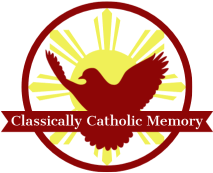What is Classically Catholic Memory?
Classically Catholic Memory is a memory work program that is both Catholic and classical in nature.
What is Memory Work?
Memory work is simply the mastery of core facts in a given subject, or the mastery of a certain body of work (poetry or Scripture, for example) using the tool of one’s memory.
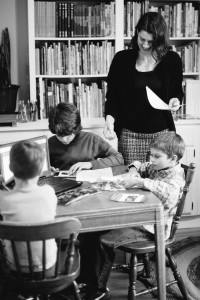
Isn’t a focus on memorization outdated? What about critical thinking skills?
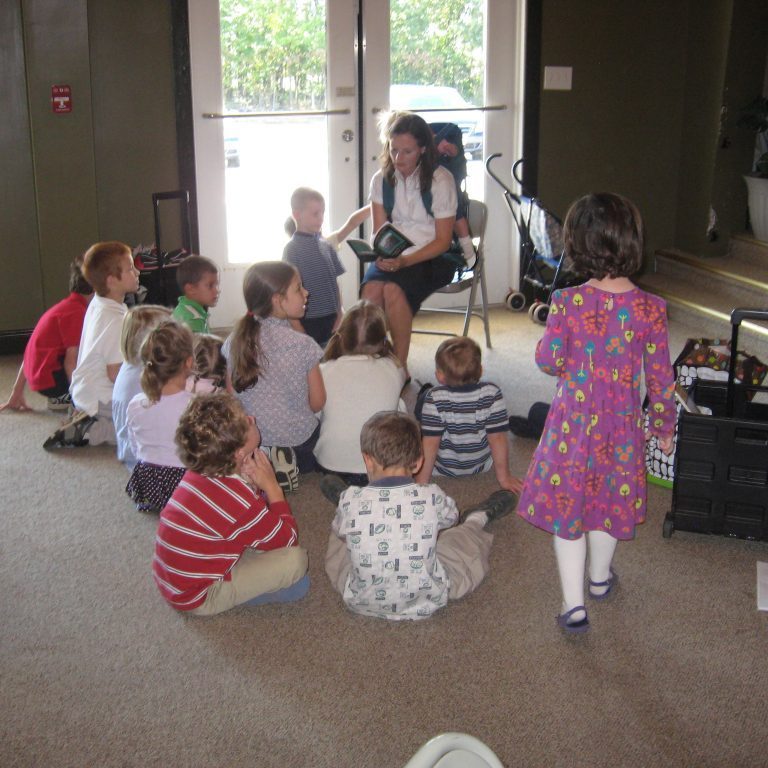
There is definitely a modern educational bias against having children memorize much of anything. This is unfortunate, as mastering a large amount of factual material over a broad range of subjects is exactly what should provide the “raw material” for those higher order thinking skills as children mature. Understanding, analyzing, evaluating, comparing, contrasting, synthesizing, and clearly expressing oneself are certainly critical skills…but if the child has never mastered the core facts of a particular subject, what is there to analyze, or evaluate, or form and express a clear opinion on?
In addition, the memorization of certain subjects has particularly unique benefits. When a child memorizes beautiful, classic poetry, he is internalizing complex, varied sentence patterns, as well as vocabulary that is generally more sophisticated than the everyday words he hears. In addition, he is being exposed to inspiring thoughts and ideals that have been expressed in memorable ways. When a child memorizes, word for word, traditional explanations of Catholic doctrine such as those found in the Baltimore Catechism, he is accomplishing something that will benefit him all his life: namely, the ability to clearly express his faith in exact, precise terms, which will act as a safeguard against the vagueness and lack of clarity that can gradually endanger one’s faith. The following is a quote from Bl. John Paul II:
“A certain memorization of the words of Jesus, of important Bible passages, of the Ten Commandments, of the formulas of profession of the faith, of the liturgical texts, of the essential prayers, of key doctrinal ideas, etc., far from being opposed to the dignity of young Christians, or constituting an obstacle to personal dialogue with the Lord, is a real need, the Synod Fathers forcefully recalled. We must be realists. The blossoms, if we may call them that, of faith and piety do not grow in the desert places of a memory-less catechesis. What is essential is that the texts that are memorized must at the same time be taken in and gradually understood in depth, in order to become a source of Christian life on the personal level and the community level.” CATECHESI TRADENDAE (On Catechesis In Our Time) John Paul II - Apostolic Exhortation of His Holiness to the Episcopate, the Clergy and the Faithful of the Entire Catholic Church given on 16 October 1979.
Those of us who grew up in the 1970s and 1980s certainly know what he meant about the “desert place of a memory-less catechesis”! But, it is exactly as he so eloquently says--memorization and understanding, in all subjects, must go hand-in-hand. It is not a case of choosing one or the other, but knowing the importance of both. What does this look like in homeschooling our children? It means we continue to do interesting and engaging projects, nature walks, science demonstrations, and reading and discussion of good literature and great ideas…but we also spend time and effort on challenging our children to memorize a wealth of material that will benefit them enormously throughout their lives!
How is Classically Catholic Memory "Classical"?
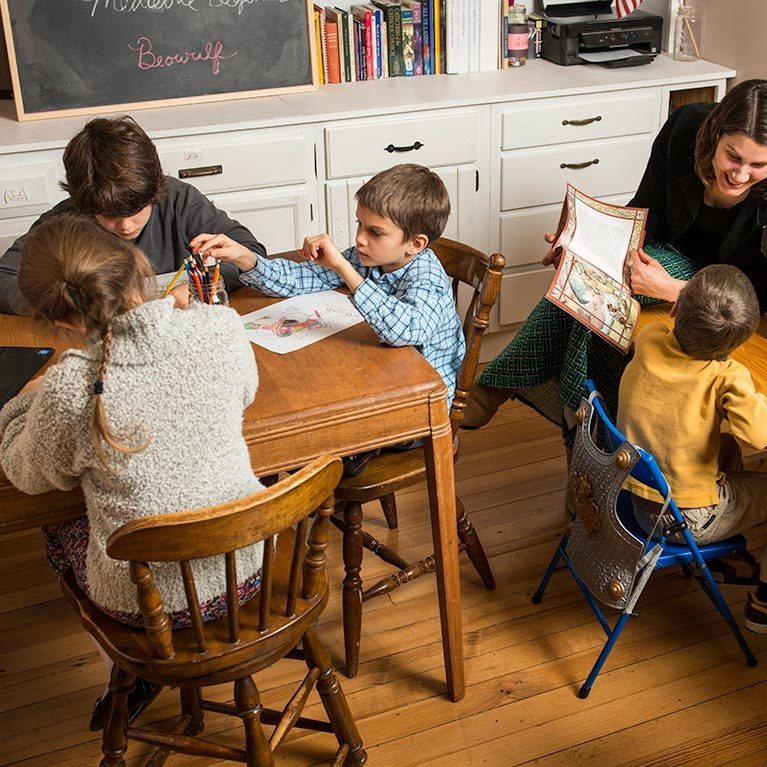
Classical education has been defined in a multitude of ways, ranging from precise curriculum characteristics to a more general philosophical focus. We like Matthew Arnold’s phrasing of “the best that has been thought and said” to describe, in a nutshell, what we place before our students as worthy of knowing about, reflecting upon, and imitating. One key characteristic of classical education is a focus on classical civilizations (Greece and Rome), and on the interplay between Greek, Roman, and Hebrew civilization that contributed to the founding of Christian society. The study of history is orderly and chronological; history did not begin with George Washington! When our children study George Washington, for example, we want them to understand references to the great Roman hero Cincinnatus.
In all of their studies and throughout their lives, they will need to understand the many references to classical civilizations that they will come across. They will study what came “in the beginning” in order to understand later ideas, events, and persons. In the history component of Classically Catholic Memory, children will spend a great deal of time learning about classical civilizations, from Greek philosophers, the Peloponnesian War, Homer, and Alexander the Great, to the founding of Rome, the Punic Wars, and Julius Caesar. What they learn in history will be reinforced by their memorization of the Timeline—the names of 144 important events and persons to be recited chronologically from Creation to John Paul II.
How is Classically Catholic Memory "Catholic"?
First and foremost, we have as our goal the teaching of our children to love Jesus Christ and his bride, the holy Catholic Church, through whom He speaks. To this end, we teach both Scripture and Catechism in the one subject, Religion; we also teach traditional and beautiful Catholic prayers and hymns that are part of our heritage as Catholics. Our history and timeline components spring from the perspective that history is not divided into “Biblical history” and “secular history”; all of history is the story of God’s action in the world, preparing a people for Himself; preparing the world for the central event of history, the Incarnation; redeeming the world; and advancing His redeeming work by the action of the Holy Spirit in the Church. Our children must see all aspects of history—the seemingly secular and the overtly religious—as part of one whole. The same Moses who led the Israelites out of Egypt grew up in the land of the Nile and the land of the pyramids, and lived close in time to such famous pharaohs as Hatshepsut and Tutankhamen.
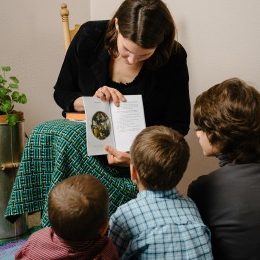
When our children hear in Scripture that Jesus Christ was born “during the reign of Caesar Augustus”, we want them to be able to form in their minds a picture of the Roman Empire—from its founding in 753 B.C. through its history of kings, Republic, and finally, Empire. When they read in Scripture about Paul’s missionary journeys, we don’t want them to consider him as just a religious figure in the Bible that somehow existed apart from the civilizations surrounding him. Rather, as they read about him speaking to the Greeks about their “statue to an unknown god”, we want them to have some understanding of Greek culture, Greek civilization, and the Greek mind—the searching for truth—that was part of God’s particular preparation of the Greeks to hear about His Son.
How can Classically Catholic Memory help in our endeavor to incorporate memory work, that is Catholic and classical in nature, into our children’s homeschooling?
Classically Catholic Memory provides detailed, step-by-step instruction on what to have your children memorize and how to help them do it, through our beautiful, high quality materials. Classically Catholic Memory removes the uncertainty many parents feel about how to incorporate memory work into their homeschool. It is geared towards children ages 5 through 12, and each “year” of the program provides 18 weeks of memory work in each subject. It can be used as a supplement to any curriculum a homeschooling family is already using.
Want to know more about our subjects, years, and materials?
Our Subjects, Years, & Materials page provides an overview of each item.
Want to know more about Classical Education or about the Schola Rosa Classical Curriculum?
Schola Rosa Curriculum - A PreK-6th Grade Curriculum that is Catholic, Classical, and Charlotte-Mason.
Other Full Curricula providers based in Classical and Catholic traditions?
Classical Liberal Arts Academy (Self-paced, online courses of study for K-12th grades)
Kolbe Academy (K-12 Homeschool Curriculum with online classes also available; Classical in method; Ignatian in spirituality)
Mother of Divine Grace (K-12 Catholic, homeschool curricula largely inspired by Laura Berquist's book, "Designing Your Own Classical Curriculum; online classes also available)
Oxrose Academy (online academy for 7th-12th grades; classical in method; Thomistic in spirituality)
